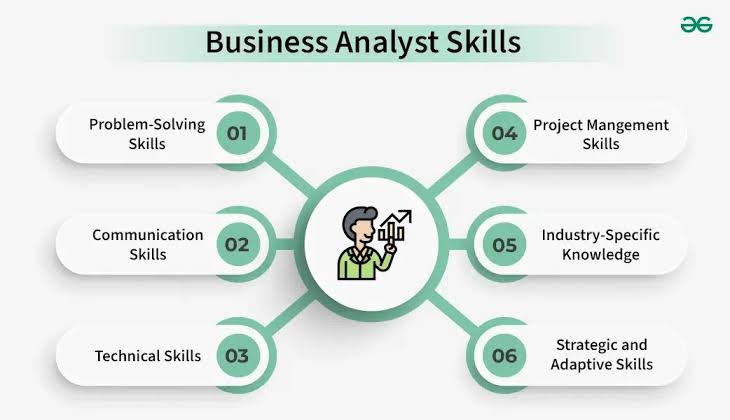Business analytics is no longer a niche function—it is central to how decisions are made across industries. Professionals who develop a blend of technical and strategic skills will be best positioned to lead with insights and drive meaningful business results
Here is an extensive and human-like article written without any bold formatting, with each section carefully broken into paragraphs for readability, and using the latest information as of June 2025.
Top 10 Business Analytics Skills for Decision-making
In today’s data-driven economy, business analytics has become a core function in driving strategic decision-making. Organizations across every industry rely on professionals who can interpret data, uncover trends, and provide insights that guide business performance. As of 2025, the demand for business analysts continues to rise globally, but success in the field hinges on mastering a combination of technical, analytical, and communication skills. Below are the top 10 business analytics skills that every decision-maker should possess, ranked from 10 to 1.
10. Data Cleaning and Preparation
Before any analysis can begin, data must be cleaned and structured. Raw data is often incomplete, inconsistent, or duplicated, and without proper cleaning, results can be misleading or entirely incorrect.
This skill involves understanding how to identify errors, handle missing values, normalize formats, and prepare datasets for advanced analysis. Tools like Python, R, and Excel are commonly used for these tasks.
Professionals who master data preparation ensure that their insights are grounded in accuracy. Clean data leads to reliable analysis, which in turn supports better business decisions.
9. Business Acumen
Analytical skills alone are not enough. Business analysts must also understand the industry they work in. Business acumen helps bridge the gap between raw data and strategic decisions.
Understanding business models, revenue streams, customer behavior, and industry trends allows analysts to ask the right questions and focus on metrics that matter.
A strong grasp of business operations ensures that data analysis aligns with organizational goals. It turns data into action rather than just observation.
8. Data Visualization
Data storytelling through visualization is essential in conveying findings to non-technical stakeholders. Charts, dashboards, and infographics help simplify complex information.
Tools such as Tableau, Power BI, and Google Data Studio are widely used to build visual reports that allow decision-makers to interpret insights quickly and clearly.
An analyst with solid visualization skills can communicate trends, comparisons, and outliers in a way that supports real-time business choices and better strategic alignment.
7. Basic Programming Knowledge
While not all business analysts need to be expert coders, familiarity with programming languages such as Python or R significantly enhances data handling and analysis.
Programming allows for automation of repetitive tasks, advanced statistical modeling, and integration of various data sources. SQL, in particular, remains a must-have skill for querying databases.
Even a basic knowledge of programming increases efficiency, enables deeper analysis, and empowers professionals to work with large and complex datasets more effectively.
6. Critical Thinking
The ability to think critically and question assumptions is key to making sound judgments based on data. Business analysts must go beyond surface-level results to identify root causes and potential impacts.
Critical thinking involves exploring alternative explanations, testing hypotheses, and evaluating the implications of different strategies. It also helps analysts avoid confirmation bias or misleading interpretations.
When decisions hinge on data, critical thinking ensures those decisions are not only informed but also intelligent and context-aware.
5. Statistical Analysis
Understanding statistics is fundamental for making sense of data and identifying significant trends or anomalies. This includes knowledge of probability, regression, variance, correlation, and forecasting techniques.
Statistical skills allow analysts to interpret patterns, test hypotheses, and validate models with confidence. These methods form the foundation for predictive and prescriptive analytics.
Businesses rely on these insights for risk analysis, market segmentation, demand forecasting, and more. Without a statistical approach, decision-making becomes guesswork rather than science.
4. Problem-solving Ability
At its core, business analytics is about solving problems. Analysts are constantly faced with questions like why sales dropped in a region, what caused customer churn, or how to optimize operations.
Problem-solving skills involve breaking down issues, identifying root causes, analyzing alternatives, and recommending data-backed solutions. These abilities turn analytics into a tool for transformation.
Organizations value analysts who not only interpret data but also apply it to real-world challenges, enabling smarter decisions and improved outcomes.
3. Communication and Storytelling
It’s not enough to generate insights; they must be shared in a compelling and understandable way. Communication skills enable analysts to influence decisions across departments and leadership levels.
Storytelling involves crafting a narrative around the data—what’s happening, why it matters, and what actions should be taken. This is especially important when presenting to stakeholders with little technical background.
The ability to simplify complex analysis and clearly articulate its relevance can be the difference between insight being acted upon or ignored entirely.
2. Data-driven Decision Making
One of the most powerful skills is using data not just to observe trends but to guide actions. Data-driven decision-making requires confidence in using analytics to shape strategy, not just validate it.
This skill combines all others: understanding business context, analyzing data accurately, interpreting findings, and making recommendations that influence real change.
Analysts who think like decision-makers and ground their reasoning in data help organizations stay competitive and responsive in rapidly changing markets.
1. Machine Learning and Predictive Analytics
At the top of the list is the ability to use machine learning and predictive modeling. As we move further into 2025, the use of algorithms to forecast future events is becoming increasingly mainstream.
From customer behavior predictions to demand forecasting and risk modeling, machine learning tools allow businesses to proactively address issues before they arise.
Skills in this area include training models, evaluating accuracy, and applying them to real business scenarios. Knowledge of tools like scikit-learn, TensorFlow, and Azure Machine Learning is increasingly in demand.
This forward-looking approach to analytics gives organizations a strategic advantage, making it the most impactful skill in today’s data landscape.
